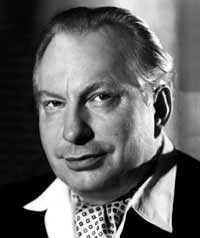
Try to Treat Others As You Would Have Them Treat You By L. Ron Hubbard
The Way to Happiness is a common-sense guide to better living. A testimony to the regard in which he held men of goodwill, no matter their faith, L. Ron Hubbard wrote this moral code for use by adults and children of all faiths.
It contains 21 precepts for successful living in a modern world. The following, Precept 20, is included here; others will be published in future editions of Freedom. More than 58 million booklets are in circulation worldwide. The Way to Happiness is a tool which can help anybody who wants to lead a better, happier life.
This is a positive version of “The Golden Rule.”
Don’t be surprised if someone seems to resent being told to “be good.” But the resentment may not come at all at the idea of “being good.” It may be because the person factually has a misunderstanding of what it means.
One can get into a lot of conflicting opinions and confusions about what “good behavior” might be. One might never have grasped — even if the teacher did — why he or she was given the grade received for “conduct.” One might even have been given or assumed false data concerning it: “Children should be seen and not heard,” “Being good means being inactive.”
However, there is a way to clear it all up to one’s complete satisfaction.
In all times and in most places, mankind has looked up to and revered certain values. They are called the virtues. They have been attributed to wise men, holy men, saints and gods. They have made the difference between a barbarian and a cultured person, the difference between chaos and a decent society.
It doesn’t absolutely require a heavenly mandate nor a tedious search through the thick tomes of the philosophers to discover what “good” is. A self-revelation can occur on the subject.
It can be worked out by almost any person.
If one were to think over how he or she would like to be treated by others, one would evolve the human virtues. Just figure out how you would want people to treat you.
You would possibly, first of all, want to be treated justly: you wouldn’t want people lying about you or falsely or harshly condemning you. Right?
You would probably want your friends and companions to be loyal: you would not want them to betray you.
You could want to be treated with good sportsmanship, not hoodwinked nor tricked.
You would want people to be fair in their dealings with you.
You would want them to be honest with you and not cheat you. Correct?
You might want to be treated kindly and without cruelty.
You would possibly want people to be considerate of your rights and feelings.
When you were down, you might like others to be compassionate.
Instead of blasting you, you would probably want others to exhibit self-control. Right?
If you had any defects or shortcomings, if you made a mistake, you might want people to be tolerant, not critical.
Rather than concentrating on censure and punishment, you would prefer people were forgiving. Correct?
You might want people to be benevolent toward you, not mean nor stingy.
Your possible desire would be for others to believe in you, not doubt you at every hand.
You would probably prefer to be given respect, not insulted.
Possibly you would want others to be polite to you and also treat you with dignity. Right?
You might like people to admire you.
When you did something for them you would possibly like people to appreciate you. Correct?
You would probably like others to be friendly toward you.
From some you might want love.
And above all, you wouldn’t want these people just pretending these things, you would want them to be quite real in their attitudes and to be acting with integrity.
You could probably think of others. And there are the precepts contained in this booklet. And you would have worked out the summary of what are called the virtues.
It requires no great stretch of imagination for one to recognize that if he were to be treated that way regularly by others around him, his life would exist on a pleasant level. And it is doubtful if one would build up much animosity toward those who treated him in this fashion.
There is an interesting phenomenon at work in human relations. When one person yells at another, the other has an impulse to yell back. One is treated pretty much the way he treats others: one actually sets an example of how he should be treated. A is mean to B so B is mean to A. A is friendly to B so B is friendly to A. I am sure
you have seen this at work
continually. George hates all women so women tend to hate George. Carlos acts tough to everyone so others tend to act tough toward Carlos — and if they don’t dare out in the open, they privately may nurse a hidden impulse to act very tough indeed toward Carlos if they were ever to get a chance.
In the unreal world of fiction and the motion pictures, one sees polite villains with unbelievably efficient gangs and lone heroes who are outright boors. Life really isn’t like that: real villains are usually pretty crude people
and their henchman cruder; Napoleon and Hitler were betrayed right and left by their own people. Real heroes are the quietest-talking fellows you ever met and they are very polite to their friends.
When one is lucky enough to get to meet and talk to the men and women who are at
the top of their professions, one is struck by an observation often made that they are just about the nicest people you ever met. That is one of the reasons they are at the top: they try, most of them, to treat others well. And those around them respond and tend to treat them well and even forgive their few shortcomings.
All right, one can work out for himself the human virtues just by recognizing how he himself would like to be treated. And from that, I think you will agree, one has settled any confusions as to what “good conduct” really is. It’s a far cry from being inactive, sitting still with your hands in your lap and saying nothing. “Being good” can be a very active and powerful activity.
There is little joy to be found in gloomy, restrained solemnity. When some of old made it seem that to practice virtue required a grim and dismal sort of life, they tended to infer that all pleasure came from being wicked: nothing could be further from the facts. Joy and pleasure do not come from immorality! Quite the reverse! Joy and pleasure arise only in honest hearts: the immoral lead unbelievably tragic lives filled with suffering and pain. The human virtues have little to do with gloominess. They are the bright face of life itself.
Now what do you suppose would happen if one were to try to treat those around him with justness, loyalty, good sportsmanship, fairness, honesty, kindness, consideration, compassion, self-
control, tolerance, forgivingness, benevolence, belief, respect, politeness, dignity, admiration, friendliness, love, and did it with integrity?
It might take a while but don’t you suppose that many others would then begin to try to treat one the same way?
Even allowing for the occasional lapses — the news that startles one half out of his wits, the burglar one has to bop on the head, the nut who is driving slow in the fast lane when one is late for work — it should be fairly visible that one would lift oneself to a new plane of human relations. One’s survival potential would be considerably raised. And certainly one’s life would be a happier one.
One can influence the conduct of others around him. If one is not doing that already, it can be made much easier to do so by just picking one virtue a day and specializing in it for that day. Doing that, they would all eventually be in.
Aside from personal benefit, one can take a hand, no
matter how small, in beginning a new era for human relations.
The pebble, dropped in a pool, can make ripples to the furthest shore.

|
|
L. Ron Hubbard
|
|
For a complimentary copy of The Way to Happiness or for more information, write to: The Way to Happiness Foundation International, P.O. Box 2930, Los Angeles, California 90028 or call (800) 255-7906.
|






